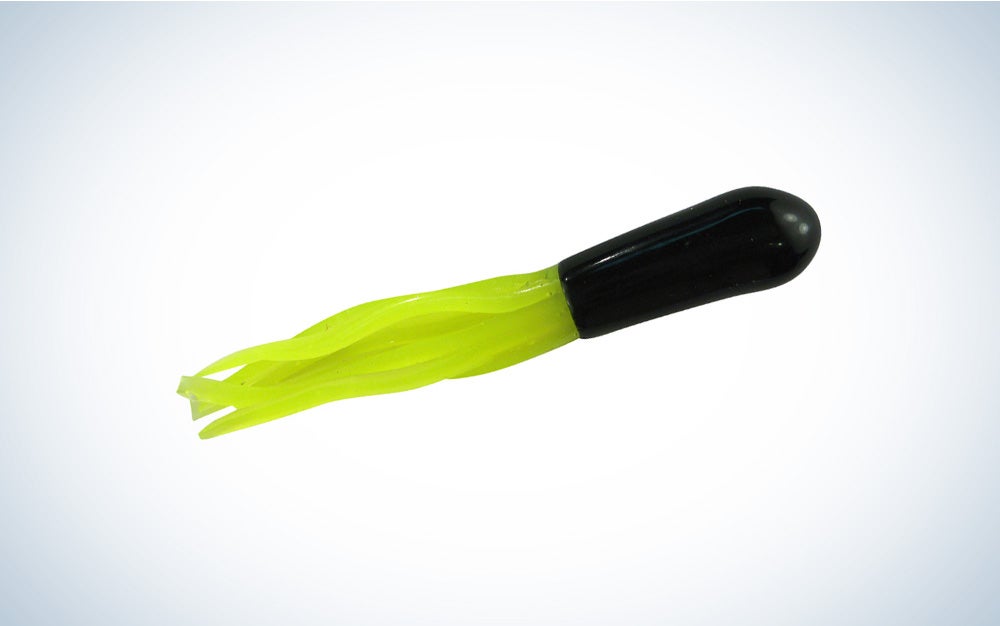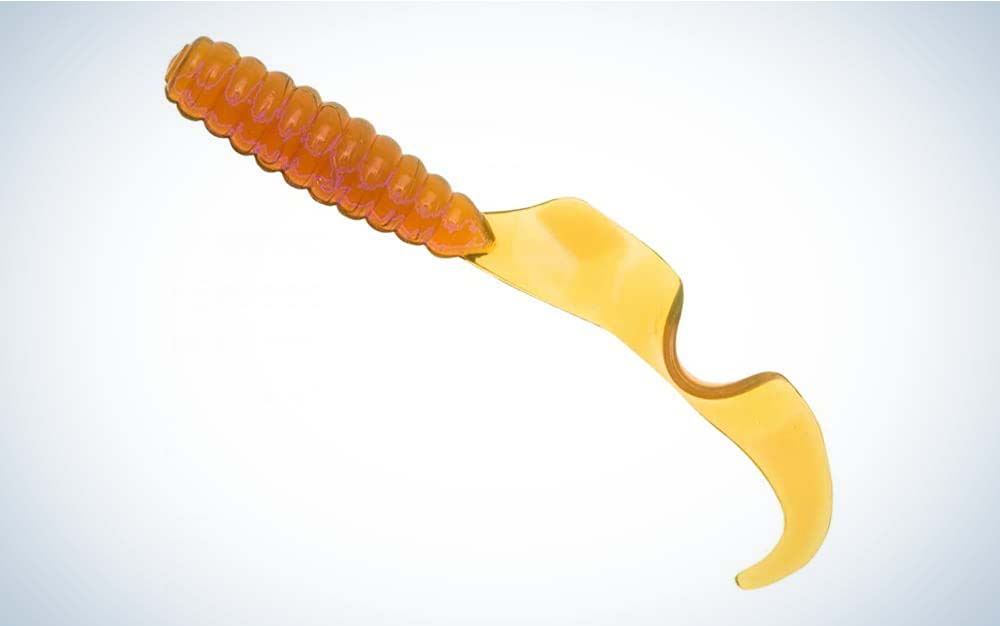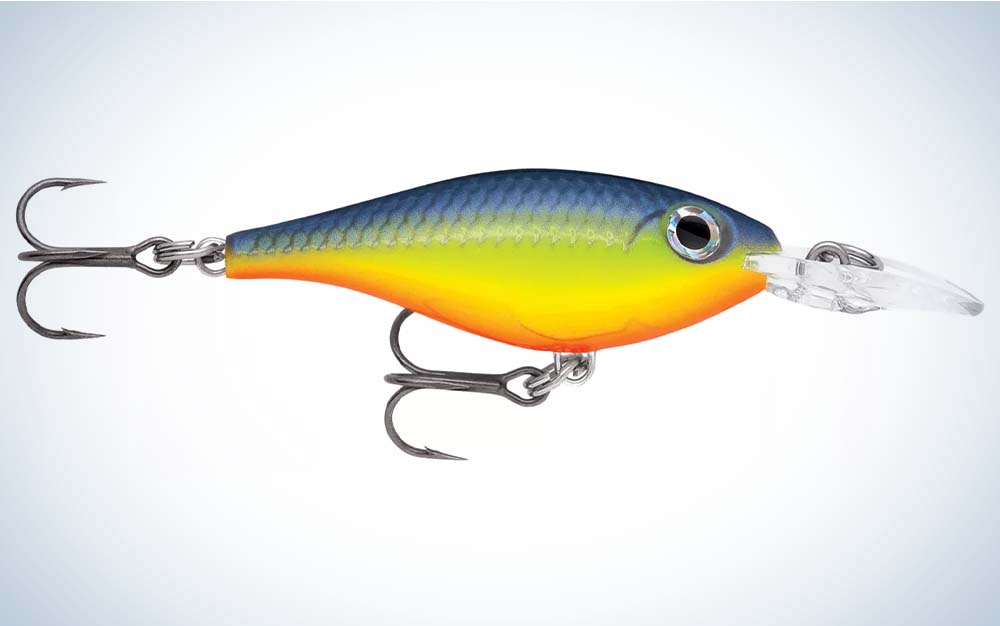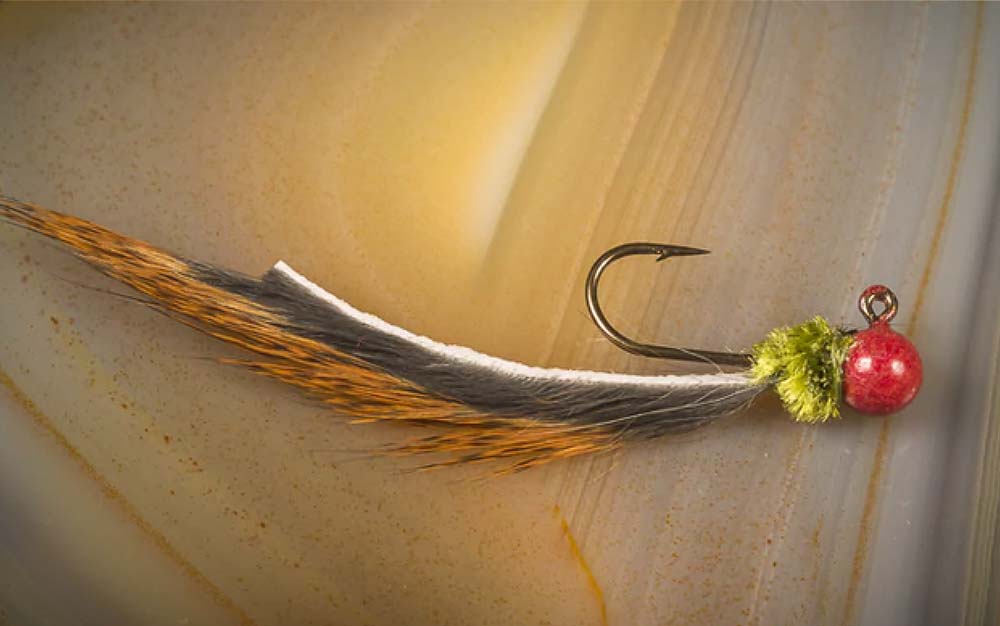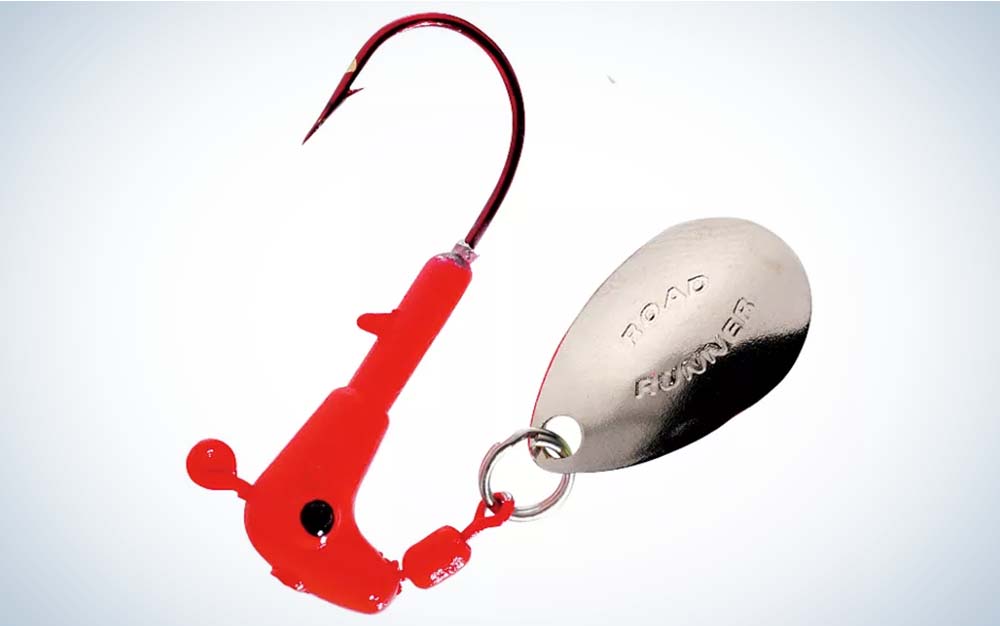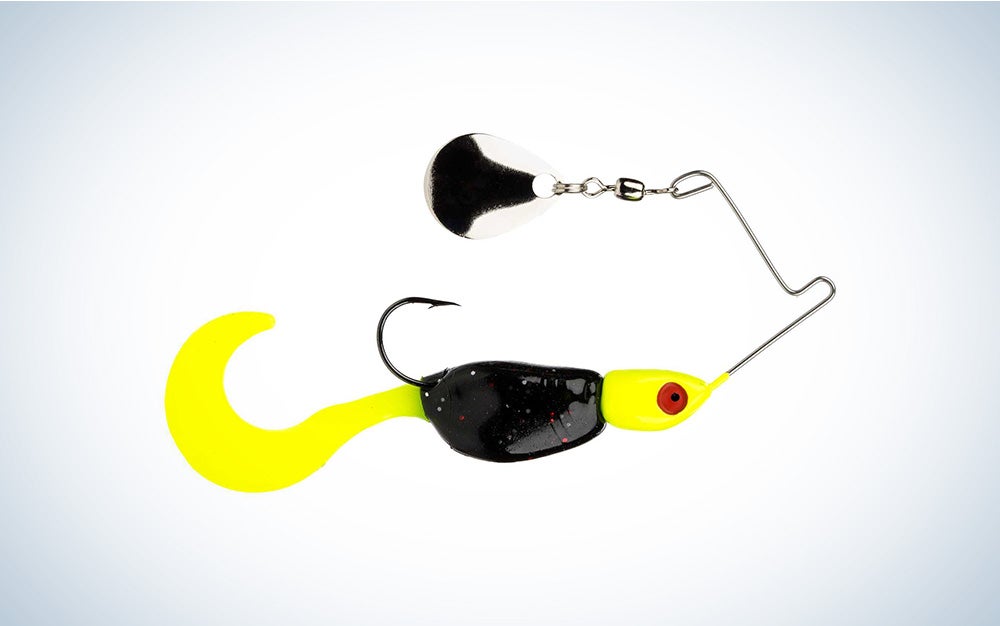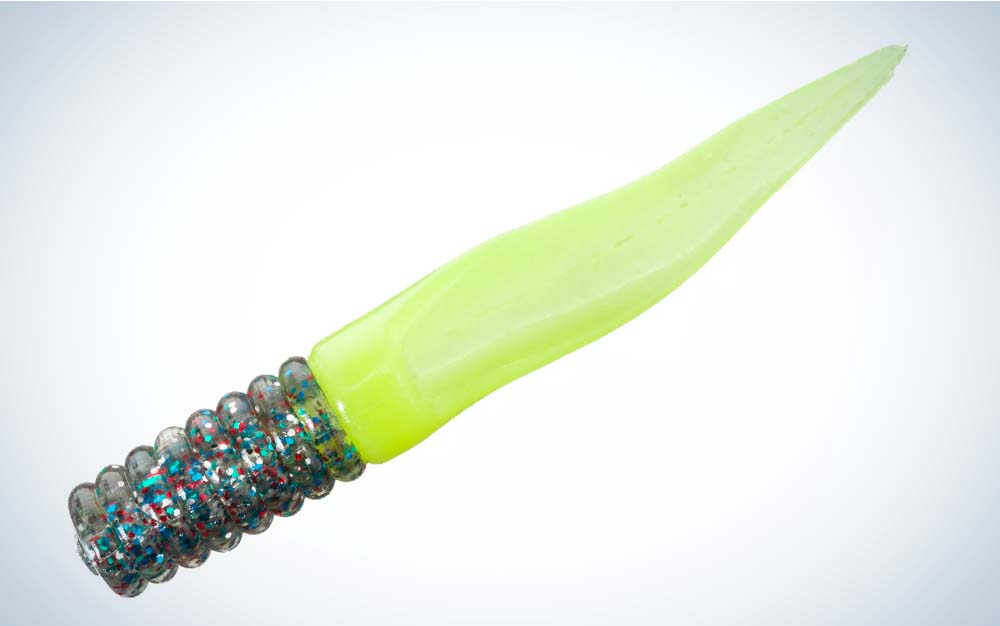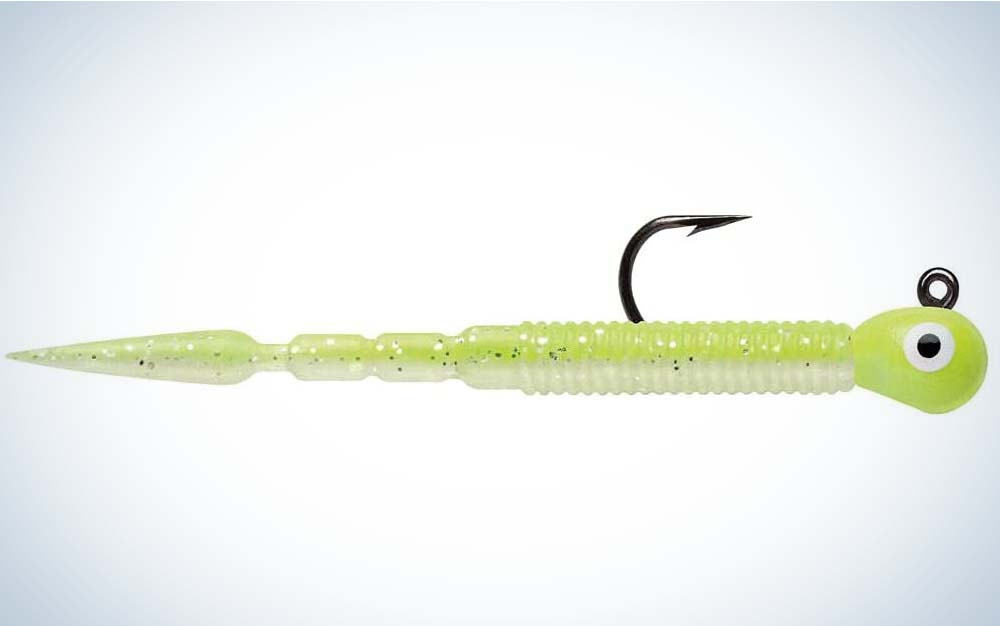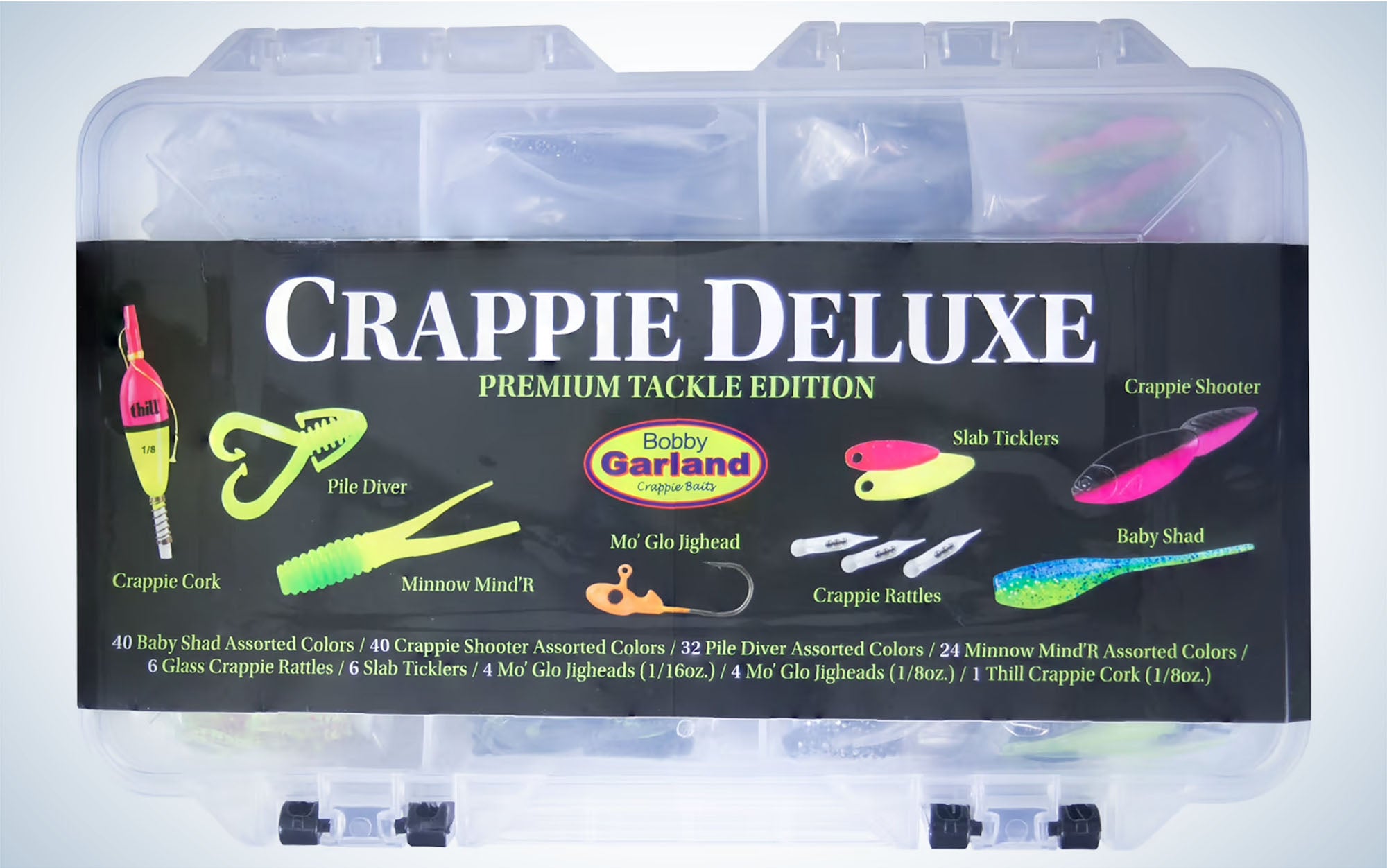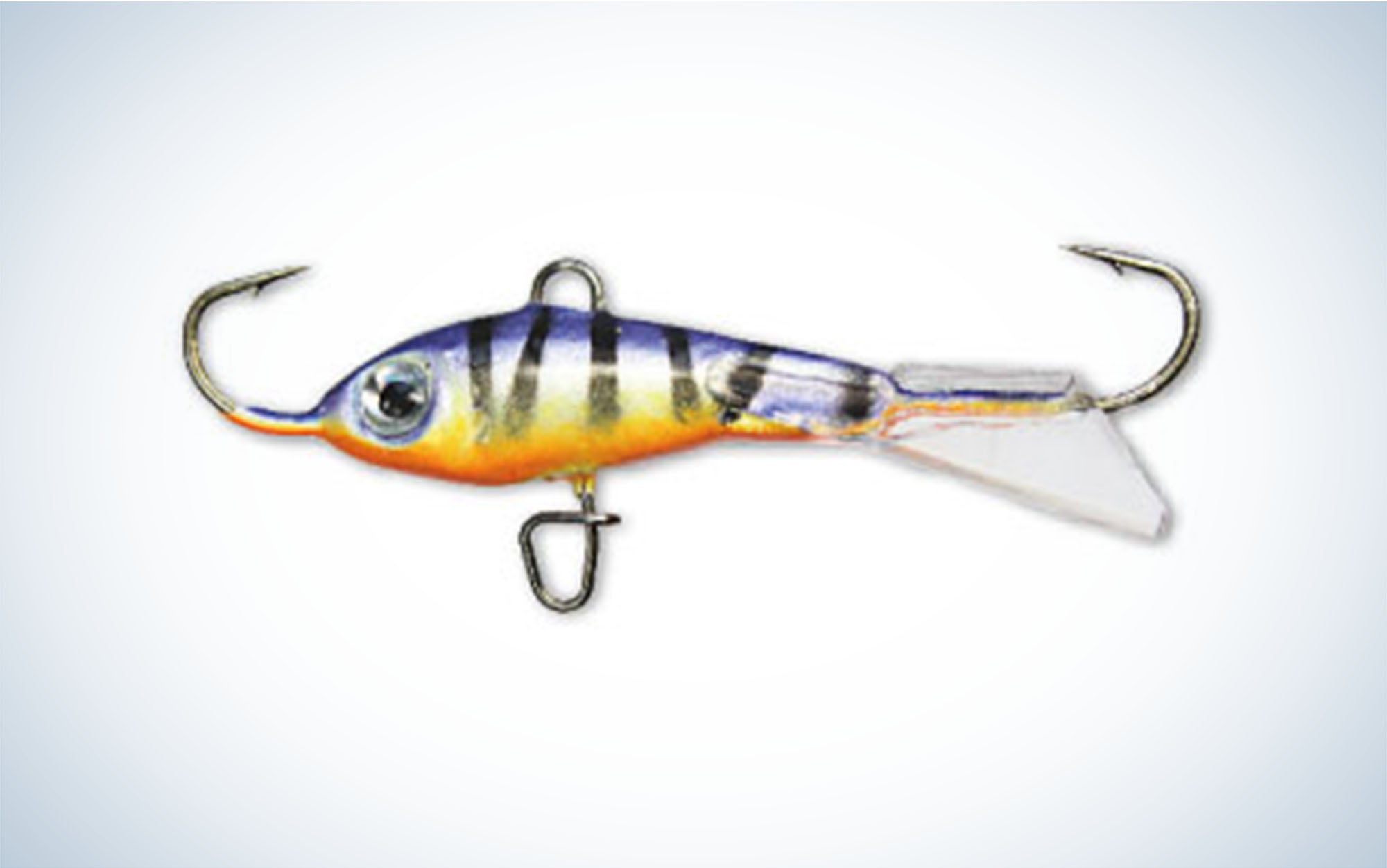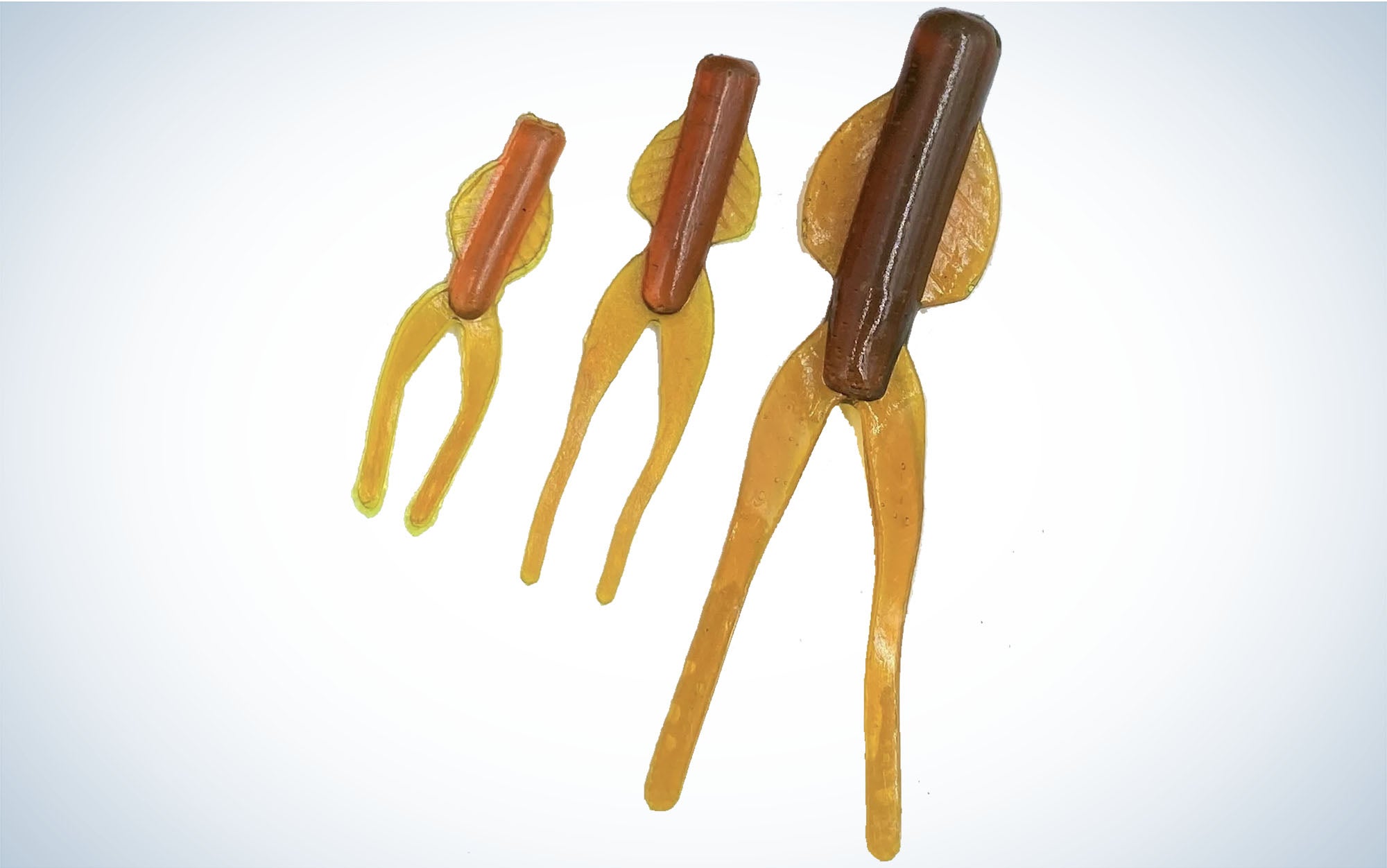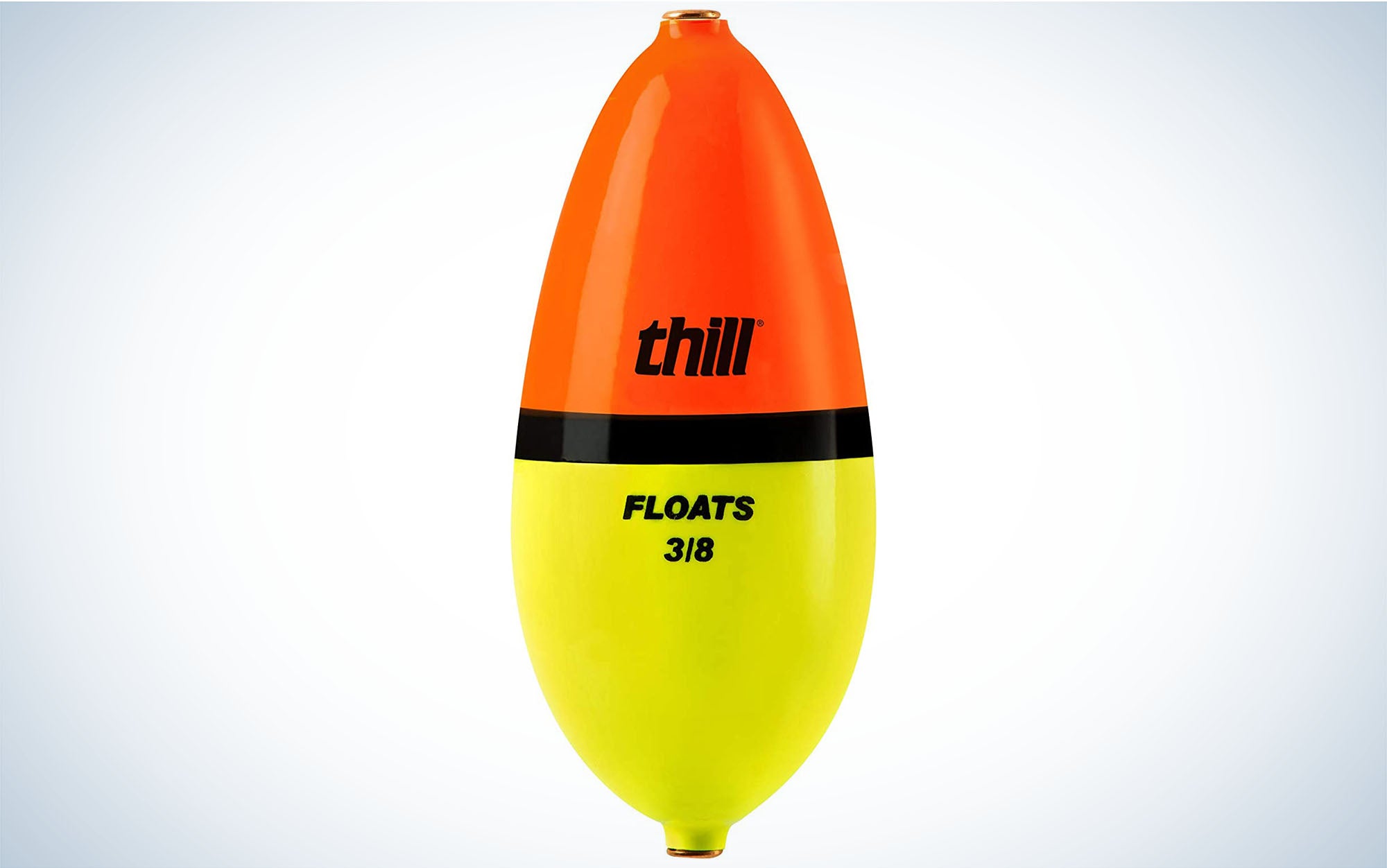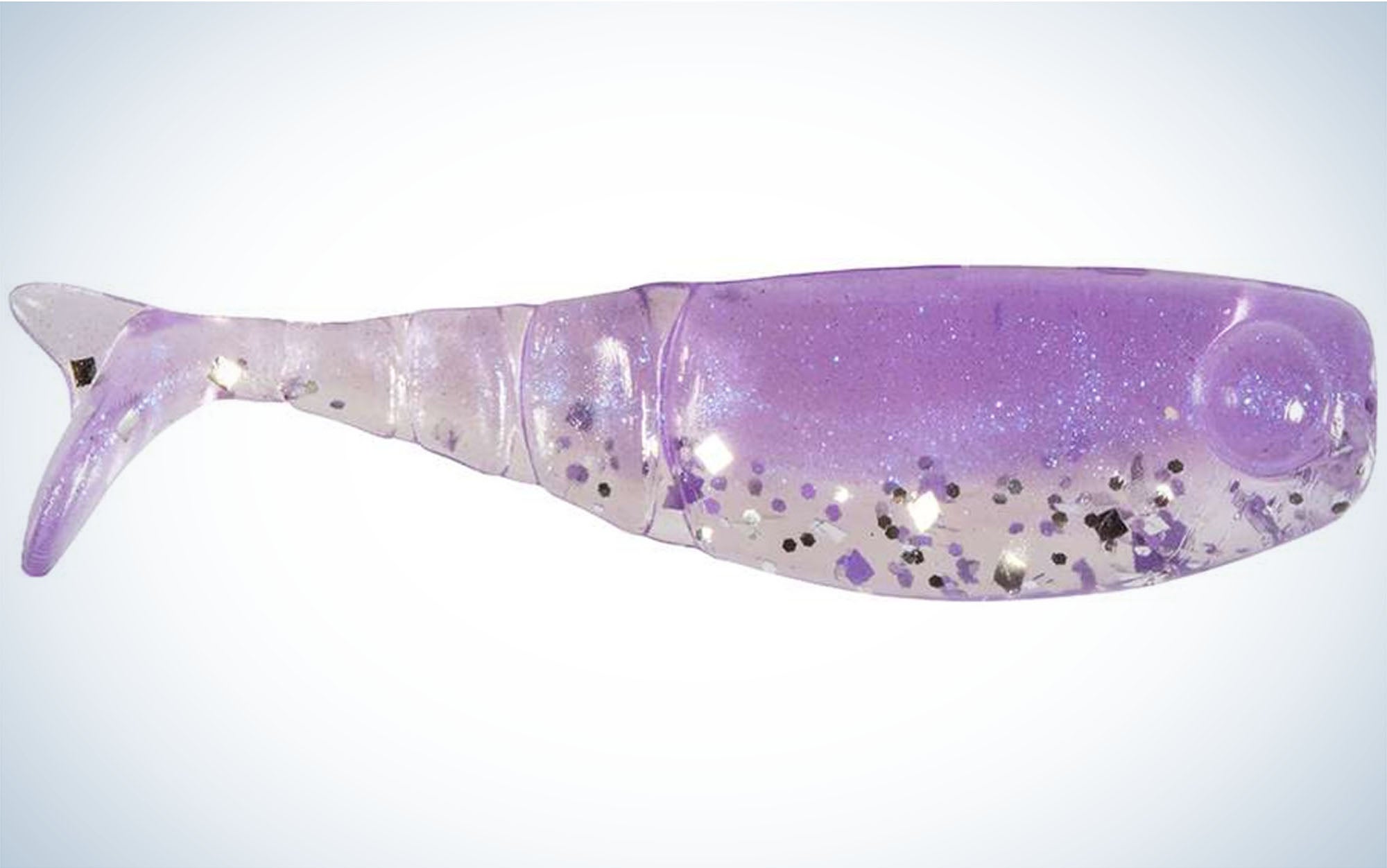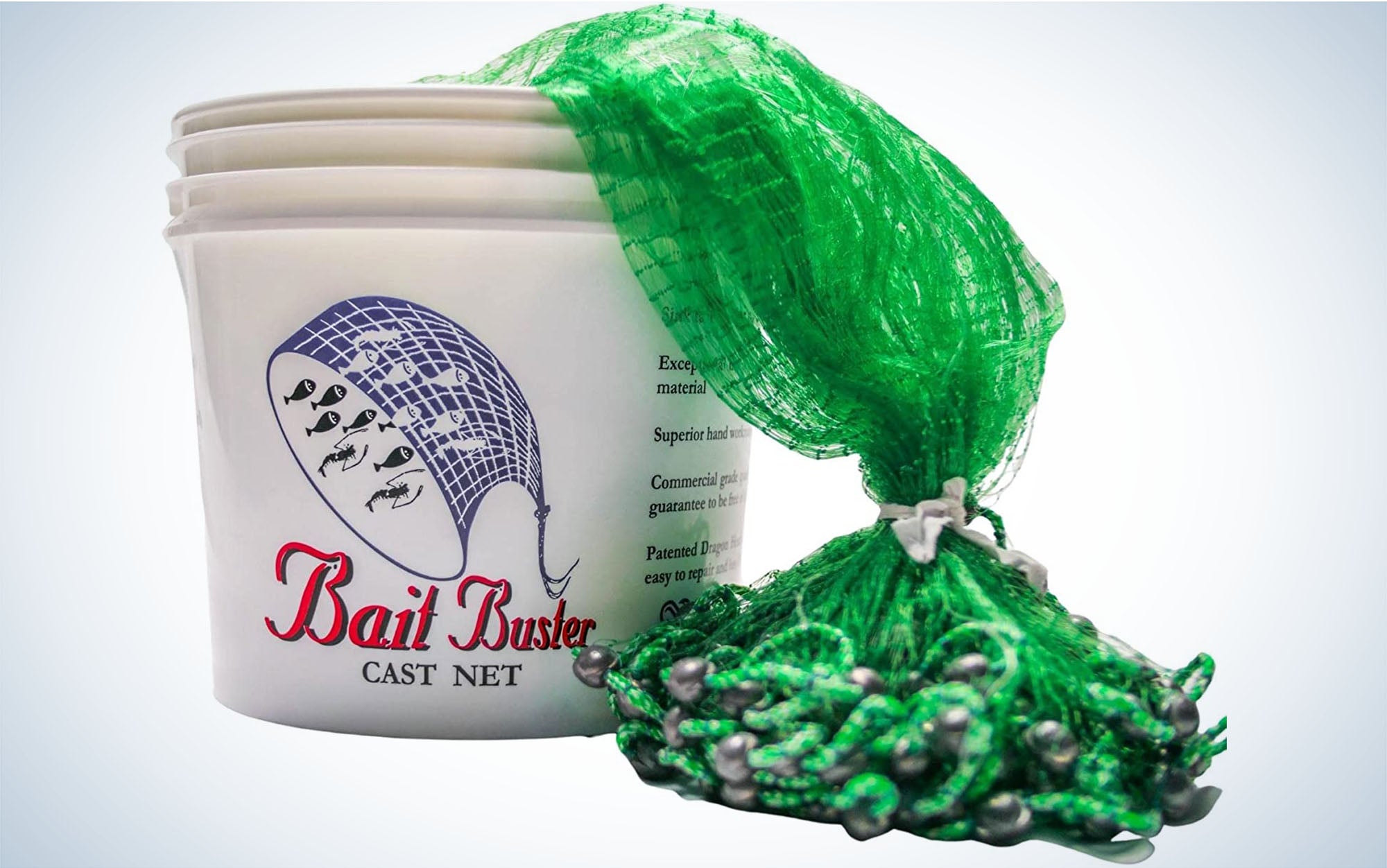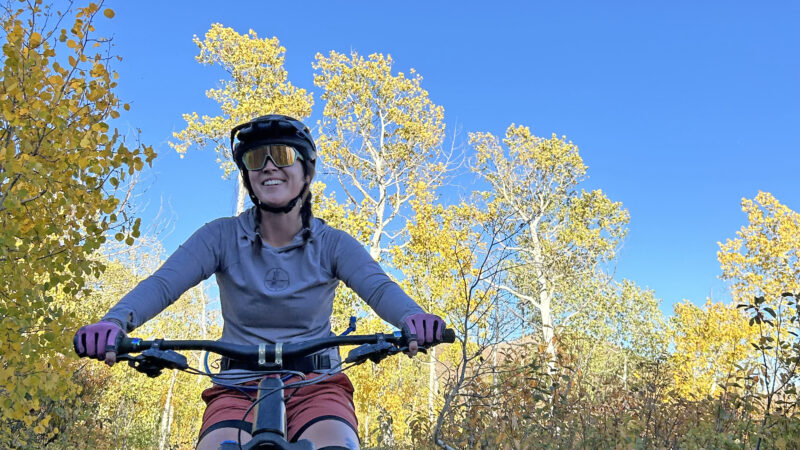The Best Crappie Lures of 2023, Tested and Reviewed
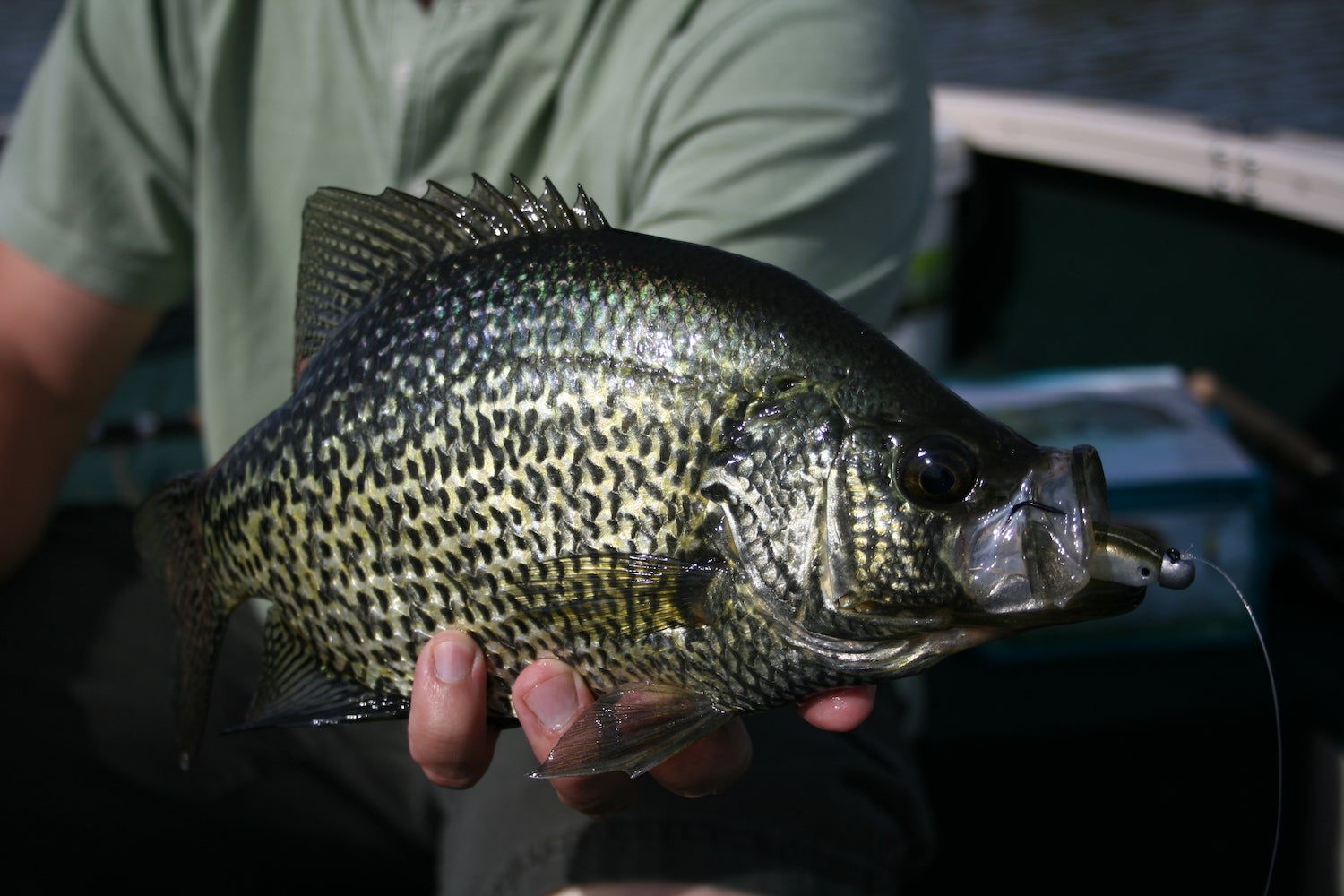
We may earn revenue from the products available on this page and participate in affiliate programs. Learn More ›
| Best Overall | 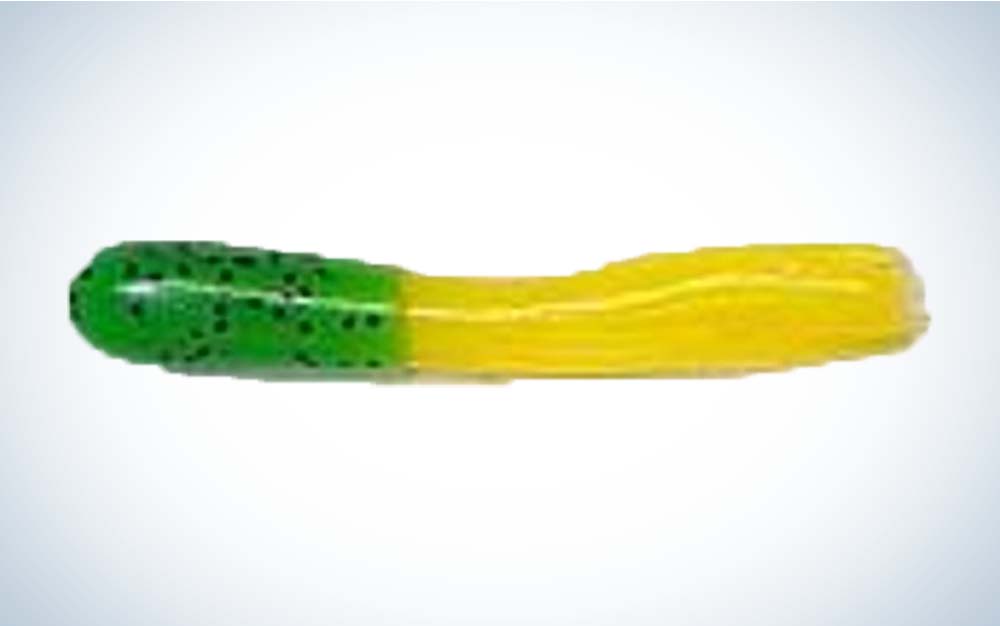 |
Southern Pro Lit’l Hustler Tube | SEE IT |
LEARN MORE
|
Summary
A versatile, consistent, and well-made lure. |
| Most Versatile | 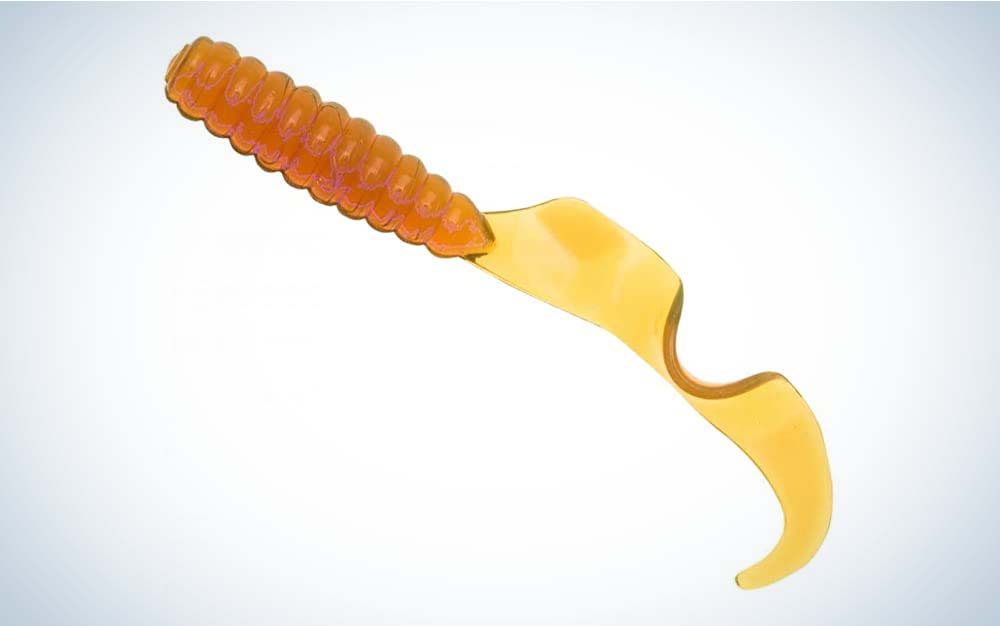 |
Z-Man 2-Inch GrubZ | SEE IT |
LEARN MORE
|
Summary
Supremely versatile—enabling the angler to cast, vertically jig, or troll. |
| Best Crappie Jig | 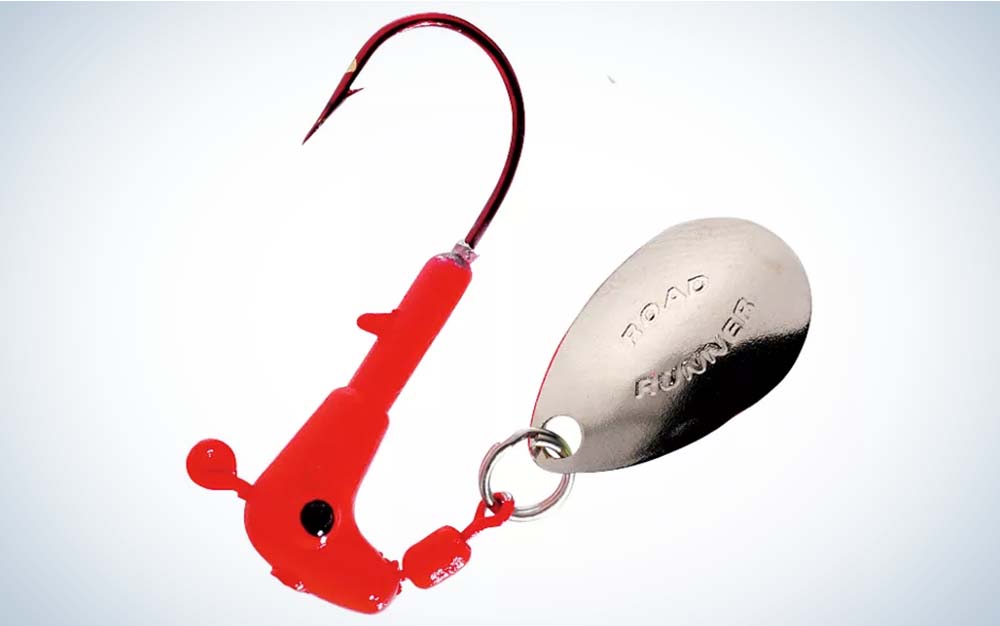 |
Blakemore Road Runner | SEE IT |
LEARN MORE
|
Summary
A classic crappie jig excelling in casting and slow trolling/strolling. |
Back in my guiding days, friends and I often spent our days off not in pursuit of bass, trout, walleyes, or even giant muskies. Nope. On those rare days between paid trips, the most enjoyable way to unwind was sneaking into some little backwoods lake where—rumor had it—giant crappies swam. That’s where I learned the importance of having the best crappie lures.
I learned that almost any lure could work when you landed on a mega school of the silvery bespeckled panfish. But I also discovered that catching the biggest crappies—and consistently getting bit in tougher conditions—meant getting a little pickier about crappie bait selection. After years of fishing for picky, giant crappie I’ve learned the best crappie lure and here are my top picks.
- Best Overall: Southern Pro Lit’l Hustler Tube
- Most Versatile: Z-Man 2-Inch GrubZ
- Best Crankbait: Rapala Ultra Light Shad
- Best Hair Jig: Jeff’s Jigs & Flies Panfish Leech
- Best Jig: Blakemore Road Runner
- Best Spinner/Blade Lure: Strike King Mr. Crappie Spin Baby Spinnerbait
- Best Dock-Shooting Bait: Bobby Garland Mo’ Glo Slab Slay’R
- Best Pre-Rigged: VMC Tungsten Probe Jig
- Best Kit: Bobby Garland 158-piece Deluxe Crappie Kit
- Best for Ice Fishing: Akara Midge
- Best for Spring: Puddle Jumper
- Best Float: Thill Floats Wobble Bobber
- Best for Big Fish: Z-Man Micro Finesse Shad FryZ
- Best for Trolling: Rapala Husky Jerk
- Best Live Bait: Wild Baby Shiner Minnows
The Best Crappie Lures: Reviews & Recommendations
The baits I use all have physical shapes and silhouettes that appeal to a crappie’s discerning eye. The way the lures swim, kick, and articulate in the water are especially important for triggering bites. So, if you’re looking to put together a crappie catching kit, here are the baits you’ll need.
Best Overall: Southern Pro Lit’l Hustler Tube
Key Features
- Sizes: 1.5, 2, and 2.5 inches
- Wide selection of colors
- Slender hollow tube profile with multiple tentacles
- Must-have colors: Chartreuse, white, smoke, black/chartreuse
Pros
- Versatile—can trim legs/tentacles to alter bait profile and rate of fall
- Consistent quality
Cons
- Lacking solid colors, such as black
Perhaps even eclipsing the twister tail grub or crappie “stinger” categories, the soft, hollow, diminutive tube remains perhaps the most appealing crappie bait ever made. Although many companies have dropped smaller tubes from their product offerings, Southern Pro’s Lit’L Hustler remains one of the best crappie lures because of its terrific, consistently well-made construction.
While I’d like to give props to Bobby Garland, who created the original “Gitzit” tube in 1964, Garland Baits no longer offers a crappie-sized tube. Thankfully, Southern Pro and several other companies, such as Mister Twister and Big Bite Baits still sell a simple fish-catching crappie tube. I give the nod to Southern Pro, which offers the broadest selection of sizes and color combinations. The Lit’L Hustler is a consistently well-made tube that catches crappies anywhere in North America. I’d choose a tube without reservation if you forced me to tie on one crappie lure for the year.
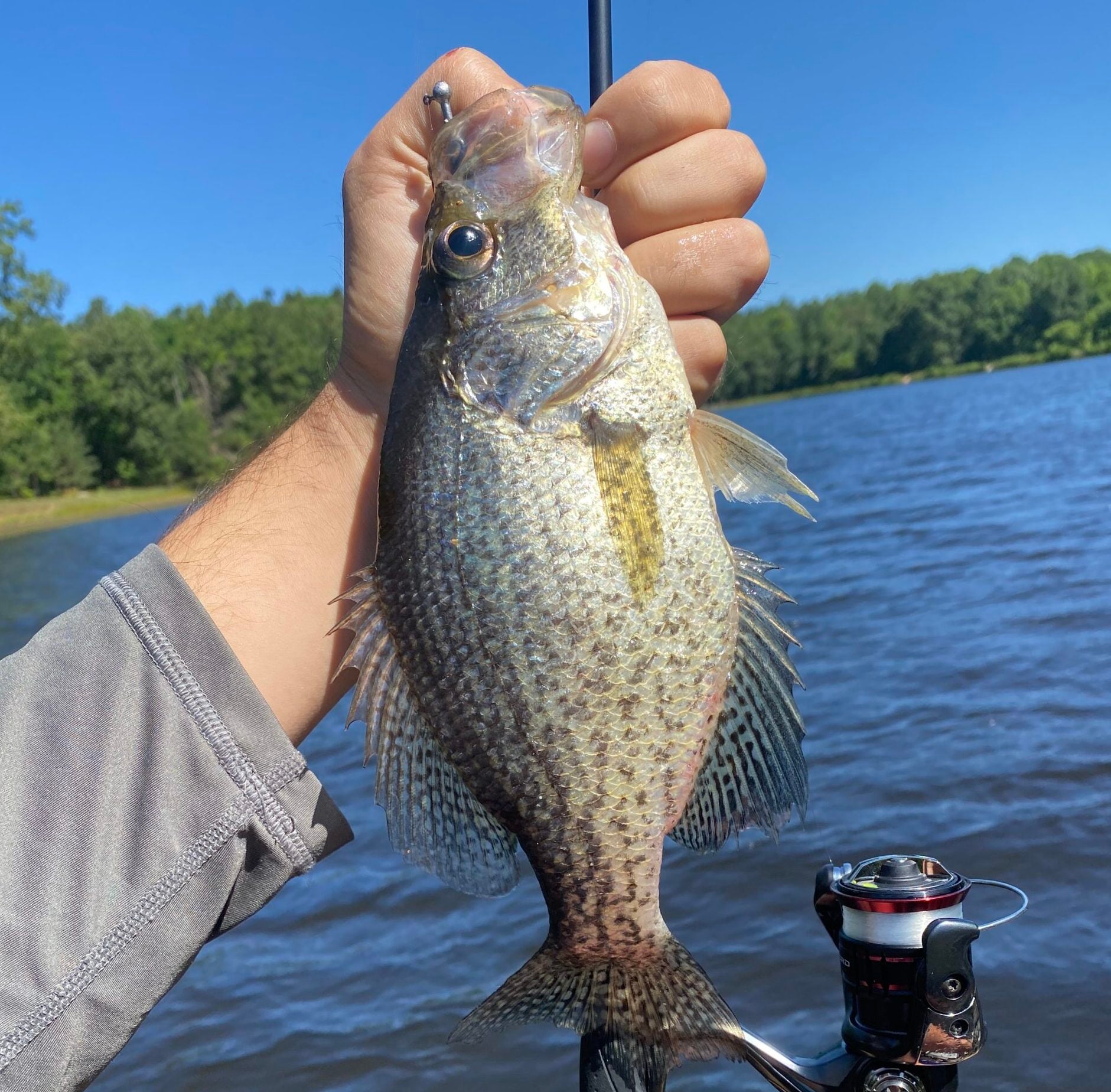
Traditionally, a tube is rigged by first sliding a slender jighead, such as a Big Bite Baits Insider Jig into the cavity of the bait. Push the eyelet through the soft material and tie it to your line; 2- to 6-pound test mono works, depending on jig weight and available cover conditions. But you can also fish a tube effectively by rigging it like a grub, threading the tube onto a standard ball-shaped jig. While this allows you to swap baits without retying, it also changes the bait’s trajectory to a head-first sinking motion instead of a more horizontal descent.
Read Next: Best Crappie Rods
Most Versatile: Z-Man 2-Inch GrubZ
Z-Man
Key Features
- Unique ElaZtech material
- Classic 2-inch grub/twister tail profile
- Eight grubs per pack
- Made in the U.S.
- Must-have colors: Electric Pink, Glow, Motor Oil, and Shimmer Pearl
Pros
- Highest fish-per-bait rating of any crappie grub
- Super soft
Cons
- Must store baits in original packs
Among the top general bait profiles in fishing, the Z-Man GrubZ is perhaps the best option in this classic category. After fishing some of Z-Man’s other super soft yet implausibly durable ElaZtech baits with astonishing success, I discovered the GrubZ and found it to be extremely appealing to crappie and all panfish. Its soft, razor-thin tail pulses and ripples at any retrieve speed—fast or slow swimming or simply dragged and twitched along the bottom. Moreover, the bait’s buoyancy assures its tail will hover and slightly ripple when you stop the retrieve, or let it rest on the bottom. This means you’ll often receive bites by simply letting the bait sit on the bottom.
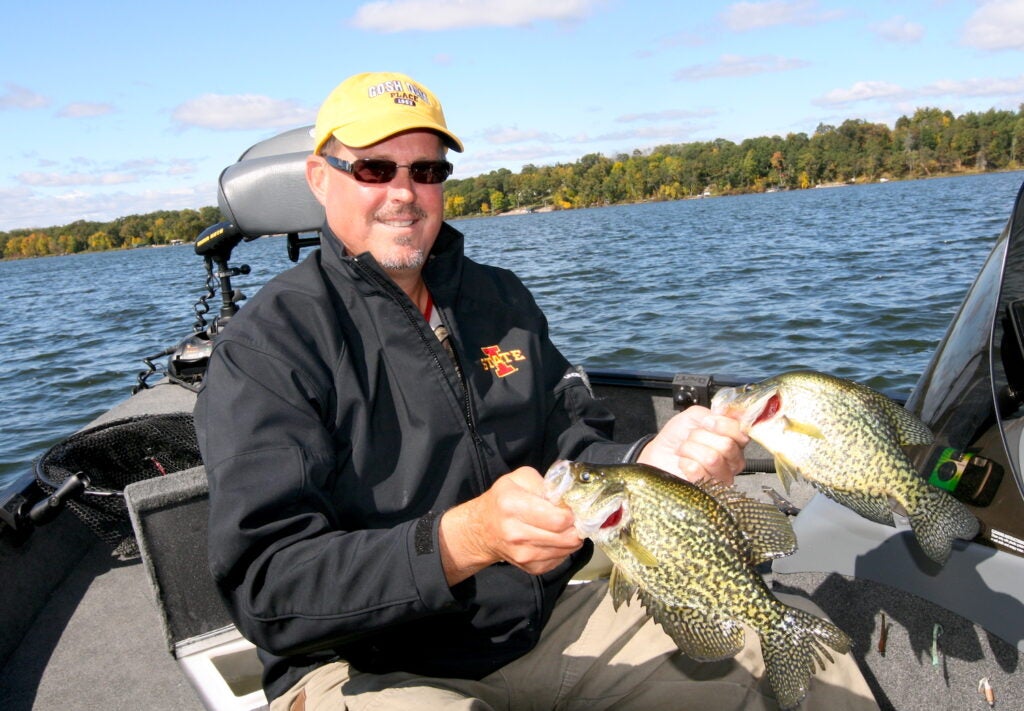
The only con of this bait is that the ElaZtech material cannot be stored next to other types of soft plastics and you must avoid storing it in high heat. But, if you keep the grubs in their original packaging and don’t leave them in your car on a hot day, all will be well.
You can buy them in 2, 2.5, and 3-inch sizes and nine colors. I like the 2-inch size for most crappie fishing. For colors, try Electric Pink or Glow in darker water; Motor Oil or Shimmer Pearl in clear conditions.
Best Crankbait: Rapala Ultra Light Shad
Rapala
Key Features
- Length: 1.5 inches
- Dives 4- to 5-feet deep, cast or trolled
- Thin shad/baby panfish profile
- Sinks slowly on the pause
- Must-have colors: Hot Steel, Pink Clown, and Yellow Perch
Pros
- Proven Rapala Shad Rap action—tight, subtle shimmy that flashes with each body roll
- Weighted body for easier casting
- Catches bonus species, such as bass, trout, pike, and walleye
Cons
- Toothy pike like to snip them off your line
- Relatively expensive
Trolling is an underutilized approach for crappies, and the Ultra Light Shad has proven to be a bonafide fish catching machine everywhere I’ve fished it. The little diving bait perfectly matches yearling shad as well as baby bluegills and crappies, which often fill the tummies of big crappies.
It’s a Rapala, which means the lure runs perfectly out of the box almost every time. Unlike other crappie-sized crankbaits that feature fat, bulbous bodies, the Ultra Light Shad is flat, slab-like, and thin, offering a realistic facsimile of the prey fish crappies prefer to eat, making it one of the best crappie lures.
The Ultra Light Shad runs to the optimal depth of about 5 feet for trolling over vegetation—just deep enough to occasionally nick the plant tops. For deeper duty, run it behind a crappie trolling weight or a pinch-on style sinker. In dirty water, Hot Steel and Pink Clown are excellent colors. While Yellow Perch produces excellent action in clear water fisheries. I run a 7-foot medium-light power spinning rod and 6- or 8-pound test braided line for trolling. Tie in a 3- to 6-foot section of 4- to 8-pound test fluorocarbon to the lure, which adds stealth in clearer water. Give the lure occasional twitches of the rod tip to make it dart and pause—an excellent triggering maneuver.
Best Hair Jig: Jeff’s Jigs & Flies Panfish Leech
Jeff’s Jigs
Key Features
- Micro #10 VMC jig hook
- Weight: 1/32, 1/64, and 1/80 ounce
- Tied with a squirrel strip (tail) and chenille (body)
- Powder-coated jig head
- Must-have colors: black or brown
Pros
- Simple, streamlined design with natural body flow in the water
- Durable—one jig can last 30 or more fish
- Can shorten tail to any size with scissors—and still retain natural action
Cons
- Jeff’s Jigs is a popular, boutique jig tier, so orders can take a few weeks to fill
I can’t think of a better lure for casting or sight fishing crappies in shallow, clear to stained waters than a Panfish Leech. Pitch the jig a few feet in front of a big crappie with 2- or 3-pound test mono and get ready. Give the jig short, quick twitches of the rod tip to make the jig’s tail undulate like a live leech. Or work it beneath a float, imparting occasional darting action to trigger bites.
While most natural fiber crappie jigs utilize marabou feathers, tier Jeff Wenger uses fine strips of squirrel hide—a radically underrated jig material in terms of natural underwater action and flow. Although you might convince Wenger to tie Panfish Leeches in various bright colors—or different sizes to spec—it’s hard to imagine anything better than a simple 1/16-ounce black or natural (brown) pattern for crappies or other panfish.
Best Jig: Blakemore Road Runner
Road Runner
Key Features
- Pony-shaped jighead with chin spinner
- Willowleaf or Indiana blade
- Weight: 1/32, 1/16, ⅛, and ¼ ounces
- Must-have colors: white, black, and chartreuse
Pros
- Road Runners are now available in eight different configurations, with standard or premium hooks, premium paint jobs, different blade shapes, and bait additions, such as marabou or soft plastics
Cons
- Lack of tiny or “micro” sized hooks/weights
- Blade can be a deterrent at times
The Road Runner remains one of the most recognizable and productive crappie jigs ever made. Designed by Bert Hall of Forsyth, Missouri in 1958, the Road Runner is perhaps the best-selling crappie lure of all time. (The 1/8-ounce white marabou Road Runner remains Blakemore Lure Company’s top seller today.)
Hall’s prescription for fishing the lure was simple: “You can’t fish a Road Runner wrong, as long as you fish it slow.” One excellent method for fishing the jig is to simply throw it behind the boat, set the trolling motor to 4, and start “strolling” along a dropoff, creek channel, or weed edge. Jig the lure once every five to ten seconds for triggering power. A 2-inch twister-tail like the aforementioned Z-Man GrubZ has for me been a proven Road Runner accoutrement that can last a full day’s fishing.
The addition of a tiny “flicker” blade to a well-balanced jighead adds just enough flash and vibration to attract baitfish-seeking crappies. Rig it with your favorite soft plastic tail or even a live minnow. This classic crappie jig excels both for casting and slow trolling/strolling.
Best Spinner/Blade Lure: Strike King Mr. Crappie Spin Baby Spinnerbait
Strike King
Key Features
- Weight: ⅛ ounce
- Pre-rigged with Strike King Shadpole body
- Must-have color: Chartreuse/black
Pros
- Pre rigged with a twister-tail style bait in proven fish-catching colors
- Can be cast or trolled to cover water fast
Cons
- Plastic body requires frequent replacing
No one believes crappies will consistently attack a spinnerbait until they’ve seen it happen. But in warmer water periods, while casting or slow trolling along a grass line or brush pile, I’ve boated well over a dozen nice fish per hour. The 1/8-ounce size of the Spin Baby is ideal for working through shallow cover, or even counted down into deeper brush or vegetation. While there are better lures for fishing tight clusters of crappies or small areas, the mini spinnerbait really proves its mettle for covering water and discovering crappies spread across larger areas.
In many waters, the chartreuse/black pattern remains the big scorer. Replace the original Shadpole body with a more durable Z-Man Slim SwimZ or GrubZ for non-stop action and dozens of fish per bait.
Best Dock-Shooting Bait: Bobby Garland Mo’ Glo Slab Slay’R
Bobby Garland Crappie Baits
Key Features
- Sizes: 2 or 3 inches
- Streamlined shape ideal for skipping
- 12 per pack
- Must-have colors: Devil’s Grin, Ghost, and Pink Phantom
Pros
- No extra appendages facilitate easy skipping across the surface
- Thin spear tail flutters with the slightest rod tip movement
Cons
- Design limits its use to slower, vertical retrieves
Crappies love hiding beneath boat docks like a dog under the porch on a hot summer day. Slabs the size of pie-plates live there, for sure. But how to get a bait back in there? The answer is dock-shooting, a slingshot-like cast that propels and skips your bait way back into the darkest corners where crappies live.
Sometimes the best way to catch apathetic crappies is to simply drop something generally the right size and shape in front of their snouts. I’ve found the Slab Slay’R has the right streamlined design to easily skip way back in there, provided you’ve practiced your skipping or shooting technique.
The little grub body is easy to rig on a 1/16-ounce jighead, while the flat spear-tail quivers and kicks subtly with each twitch of the rod tip. The bait is built for slow, vertical retrieves, and shows a special ability to hover and glide—key when reluctant crappies need a few seconds to investigate before eating. Rig it onto a favorite jighead, adding a Bobby Garland Dock Shoot’R Pull Tab for safe and easy dock shooting. The red/chartreuse Devil’s Grin pattern gets chowed in dirty water. In low light, try bright-glowing Ghost. Pink Phantom shines in almost all conditions.
Best Pre-Rigged: VMC Tungsten Probe Jig
Normark
Key Features
- Compact, heavy tungsten jigheads
- Weights: 1/16 and 1/32 ounce
- Spear-tail design offers subtle kicking action
- Two pre-rigged baits per pack
- Must-have colors: Glow Chartreuse and Pink Chartreuse Glow
Pros
- Tungsten jighead sinks fast for reaching deepwater crappies
- Worm-shaped Probe body and tail undulates actively with the slightest line movement
- Excellent for deep, vertical presentations
Cons
- Heavy tungsten jighead may sink too quickly for less aggressive crappies, particularly when casting for suspended fish
Often, minimalist, worm-like soft plastics with active tail motion can be some of the best crappie lures because of their appealing presentation. The pre-rigged Probe body marries up to a tapered jighead, constructed for high-density tungsten. To fish deeper water crappies while maintaining a diminutive bait size, the stealthy Tungsten Probe Jig offers a lot of advantages over standard lead and larger plastics.
Like many anglers, I discovered the merits of tungsten jigs while ice fishing for schools of deep crappies. Turns out tungsten is equally valuable for jigging for crappies during summer and fall, when fish may suspend in deeper water, or among deep brush piles. The compact, yet fast-sink nature of a tungsten jig lets you target individual fish on sonar, and quickly drop the lure just a foot above their nose—right where crappies like it. In these deeper scenarios, glow patterns, such as Glow Chartreuse and Pink Chartreuse Glow, attract plenty of attention. Note: The Tungsten Probe Jig often works exceptionally well beneath a float/bobber, as well.
Best Kit: Bobby Garland 158-piece Deluxe Crappie Kit
Bobby Garland
Key Features
- 158-pieces
- Baits include: Original Baby Shad, Minnow Mind’R, Pile Driver, and Crappie Shooter
- Jigs and accessories include: Mo Glo Jigheads, Crappie Rattles, Slab Ticklers, and Thill Crappie Cork bobber
Pros
- Versatility
- Accessories such as a bobber, bait rattles, and attractor blades add more options for experimentation
Cons
- Lacks a swimbait and a twister tail grub for faster, search-style lure retrieves.
Few companies offer a more effective selection of crappie-catching baits than Bobby Garland; this kit features four bait shapes and colors that cover most crappie fishing situations. Garland’s Crappie Deluxe kit fits easily into a small backpack or tackle bag for travel or quick trips to new water. The kit contains baits easily adaptable to other species like trout, perch, smaller bass, and even exotics like tilapia.
While many “fishing kits” offer basic, rudimentary baits, hooks and terminal tackle, and very little versatility, Bobby Garland’s 158-piece Deluxe Crappie Kit puts four proven crappie baits in your hands—each covering different fishing situations. For vertical jigging or fishing below a bobber, choose the Pile Driver or Minnow Mind’R. For casting and jigging, the Baby Shad remains a classic crappie profile. The unique Crappie Shooter even covers you for shooting boat docks, among today’s most effective crappie techniques.
Best for Ice Fishing: Akara Midge
Akara
Key Features
- Length: 1.3 inches
- Weight: 1/7 ounce
- Rear “lip” accentuates swim and glide motions.
- Dual single hooks on each side of the lure
- Belly clip allows for adding a #8 to #12 treble hook
Pros
- Compact yet heavy body sinks fast to reach crappies in deeper water
- Flattened “slab” profile matches baby shad and crappie fry, both key crappie forage species
- Excellent lure for forward-facing sonar applications.
Cons
- Not made for fishing near vegetation or wood cover.
Beyond the northern ice fishing belt, compact but heavy jigging lures aren’t considered traditional crappie lures. But fished vertically for crappies in 10 to 40 feet of water—ice or open water—micro darting lures like the Akara Midge offer incredible efficiency and potentially hand-over-fist fish-catching action, all without the necessity to add extra bait to the hook.
For targeting schools of crappies suspended 10 to 40 feet deep, the Akara Midge is perhaps the most efficient vertical crappie lure ever devised. Fished on 4- or 6-pound test braid and a 4-pound test fluorocarbon leader, the Midge plummets quickly to depth. Best to stop it a foot or more above fish depth, as suspended crappies usually feed “up.”
Give the lure one quick snap of the rod tip, which makes it dart up and away, and then glide on a wide radius as it descends. Repeated fast pops of the rod tip will make the lure dance in a circle, showing fish another interesting action. Typically, crappies prefer the snap-stop-glide sequence, often inhaling the entire lure just as it comes to rest.
Read Next: Best Ice Fishing Lures for Panfish
Best for Spring: Puddle Jumper
Puddle Jumper
Key Features
- Dual, flattened kicker legs and gliding “wings” offer an enticing combination of actions.
- Available in 1.5, 2, and 3-inch sizes in over ten colors.
Pros
- Can be cast and jigged or fished beneath a bobber.
- Catches bonus fish like bass, trout, perch and other panfish.
Cons
- Not the best for covering water
The classic Puddle Jumper has perhaps accounted for more springtime crappies than any other lure. Particularly when presented beneath a bobber or slip float, the Puddle Jumper performs a seductive tail-kicking, gliding dance that rarely fails to entice bites.
Inspiring the design of dozens of productive bass and panfish lures over the years, the original Puddle Jumper was created by Chuck Wood in the 1970s. Although the bait remains phenomenally popular in select crappie regions, the Puddle Jumper catches fish anywhere crappies abide. The classic method is to thread the bait onto a 1/32- to ¼-ounce jighead and run it a foot or more beneath a bobber—lure depth determined by fish level.
Give the bobber a few twitches, followed by a 5 to 10 second pause before repeating. Or retrieve the set up by slowly reeling, occasionally twitching the rod tip for extra action. An overlooked method is to place the lure on a downsized dropshot rig, particularly effective for crappies hovering within a few feet of bottom.
Best Float: Thill Floats Wobble Bobber
Thill
Key Features
- Offered in four sizes, differentiated by the max lure weight supported by each bobber
- Aerodynamic shape and internal weight system
Pros
- Small and relatively sensitive to light bites, yet heavy enough to cast long distances
- Slip float design can be set to hover a bait at any depth with the use of a bobber stop
Cons
- Pear shaped design isn’t as sensitive as more slender float styles.
- Requires the use of a bobber stop for setting lure depth.
Compact and easy to cast, the Thill Wobble Bobber features an internal weighting system that maximizes casting distance. Its special design also causes the bobber to pivot or “wobble” on the surface between waves, imparting jigging action to your lure below.
When Mick Thill brought his European float designs to America in the 1980s, anglers benefitted from super-sensitive models that indicated the slightest bites. Unfortunately, when Pradco acquired rights to the company, they eliminated some of the best crappie floats, leaving a dearth of options for panfish anglers. The Wobble Bobber is an exception—an interesting, versatile design that’s easy to cast and just sensitive enough to detect lighter-biting crappies. Note that anglers often miss numerous “up” strikes, which will not sink the float. Rather, to detect these bites, watch for the bobber to tip on its side, which signals that a crappie has engulfed the bait while swimming in an upward orientation.
Best for Big Crappie: Z-Man Micro Finesse Shad FryZ
Z-Man
Key Features
- 1-¾-inch segmented swimbait with easy-to-activate tail kicking action
- Imitates a baby shad or panfish fry
- Soft yet incredibly durable ElaZtech material
- Compatible with Z-Man Micro Finesse ShroomZ jigheads
Pros
- Super soft for accentuated swimming action.
- Durable enough to last for dozens of fish, or even multiple fishing days, per bait.
Cons
- Rigging on a jighead requires a minor learning curve
While smaller crappies primarily filter-feed on zooplankton and aquatic micro-invertebrates, larger crappies begin turning toward larger baitfish forage as they age and require greater caloric intakes. Small shad and even young members of their own family (baby crappies and sunfish) attract attention from more big crappies than any other food source.
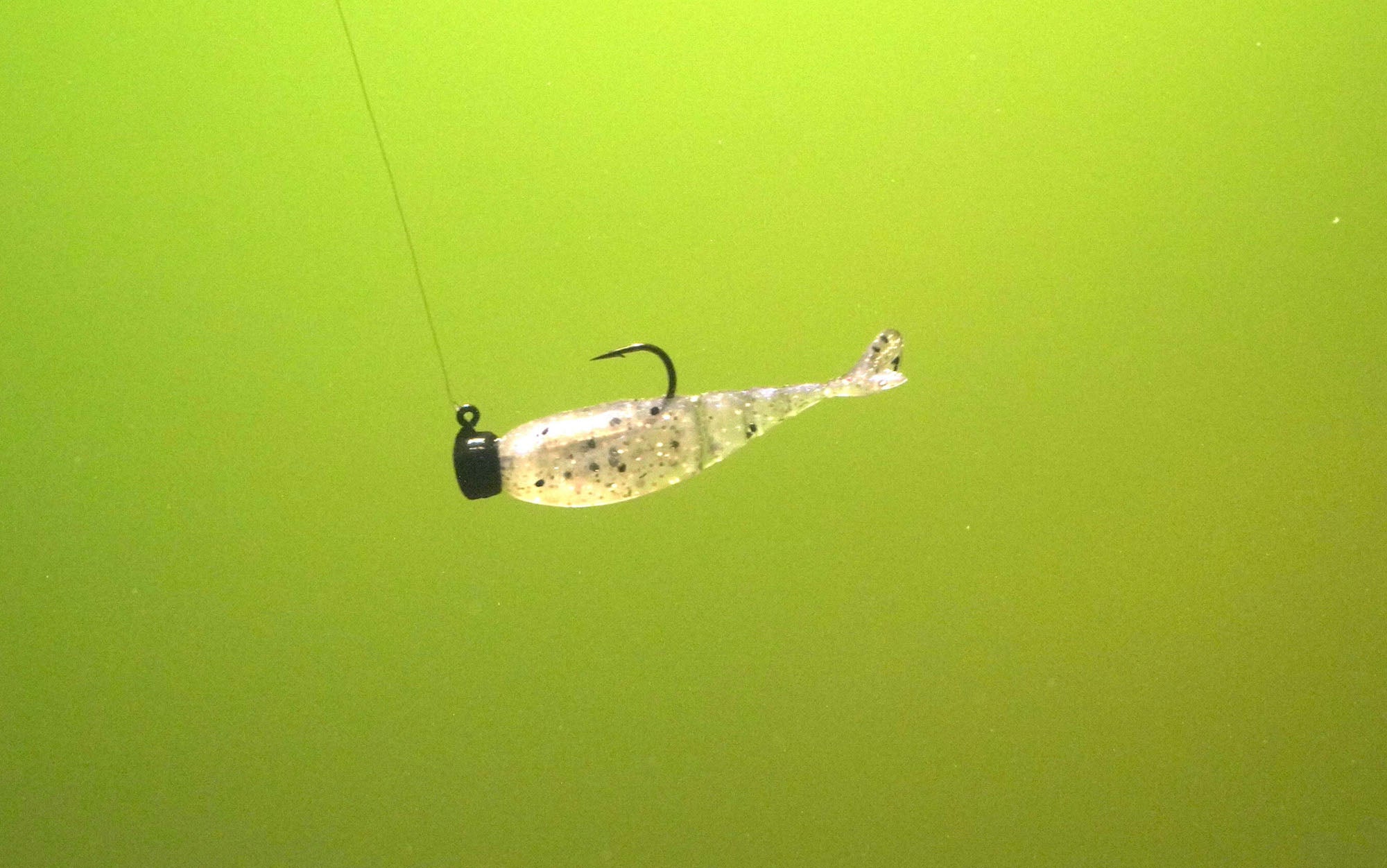
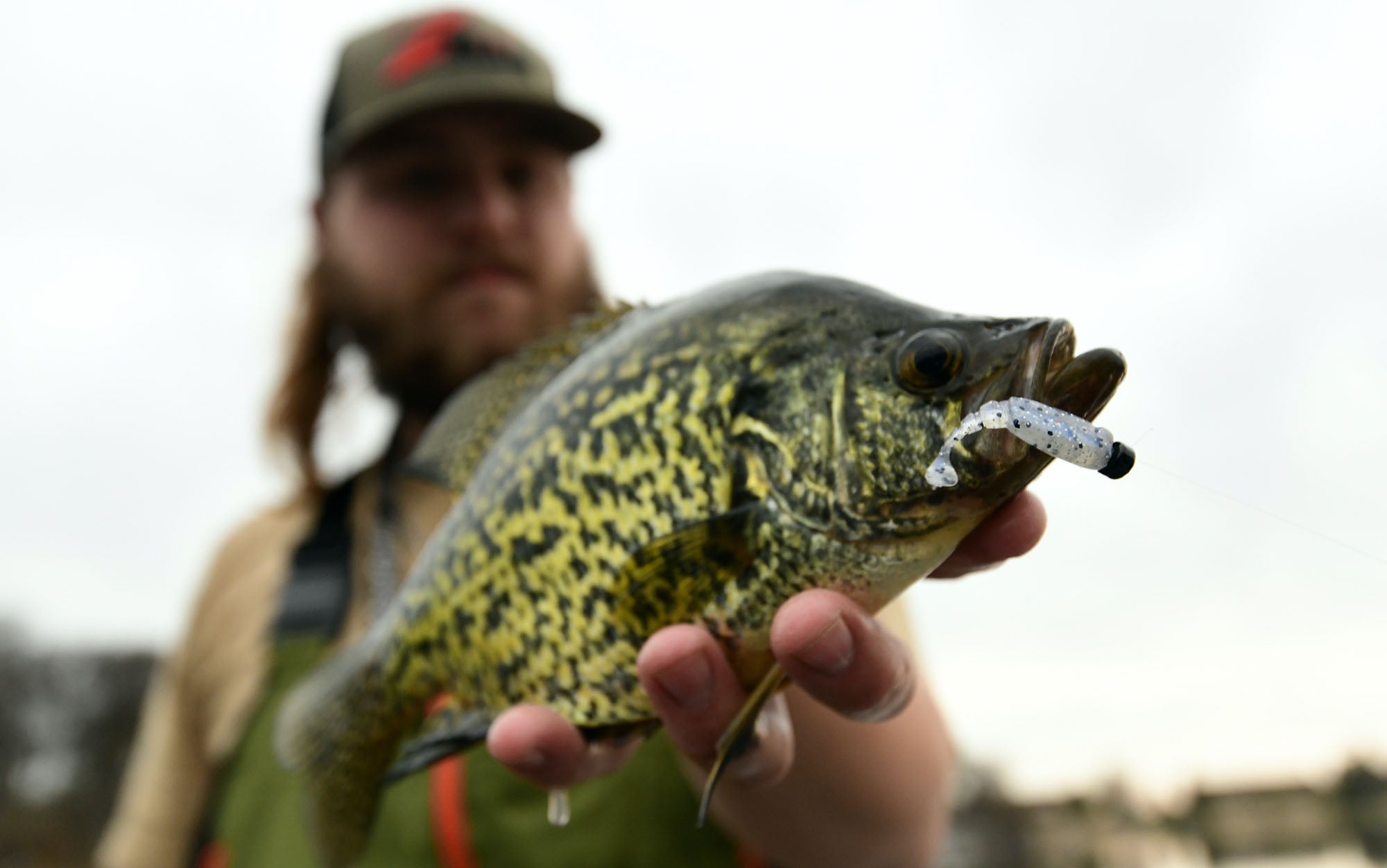
While you could also add crappie-sized crankbaits to the list of trophy crappie producers, Z-Man’s Shad FryZ swimbait has quickly garnered a substantial crappie-focused fanbase. While the micro swimmer produces plenty of action from crappies of all sizes, it’s especially effective at selecting for bites from true slab-sided fish. It’s also among the easiest panfish bait to activate and fish effectively, almost regardless of retrieve speed. After threading the bait onto the jighook, pinch the bait’s head and pull it over the jig collar—or keeper barbs—rather than pushing it over the jig, as per traditional soft plastic baits. Reel slow, fast, or stop-and-go, benefitted by its ever-active kicker tail.
The first ever panfish-sized swimbait made from Z-Man’s ElaZtech material, the Shad FryZ has already ascended the ranks of popular crappie baits, radically effective for big crappie, perch and other panfish, plus bonus bass. The bait’s resilient ElaZtech material allows for super-thin swimming segments, yielding active tail-kicking action at any retrieve speed, including as the bait freefalls, as well as incredible durability.
Best for Trolling: Rapala Husky Jerk
Rapala
Key Features
- Universal 2.5-inch minnow shape
- Runs true at almost any trolling speed
- Neutrally buoyant for pausing and hovering the lure over vegetation or for double duty as a casting lure
Pros
- Consistent trolling action
- Dives 4 to 6 feet; up to 8 feet as line-length behind the boat increases to 100 feet or more
Cons
- Treble hooks are exceptional crappie catchers, but frequently snag vegetation and woodcover.
- Lure requires additional in-line weight for fishing deeper water.
It’s surprising how few crappie anglers trust crankbaits. If you’re still skeptical, tie on a #6 Husky Jerk and see what happens next; think of it as your gateway crank for big crappies (and other panfish, too.) Trolled or cast, the classic Rapala minnow shape could be renamed the “vacuum cleaner” for its propensity to draw strikes from any active crappie in the neighborhood. Moreover, this little lure excels for finding crappies on unfamiliar water. Throw it 30 to 70 feet behind the boat, start driving around at 1 to 1.3 mph and eventually, your rod will jump and bend.
Armed with premium VMC hooks and internal rattles for extra sound, the Rapala Husky Jerk has been one of the more pleasant crappie-catching surprises in recent seasons. Equally effective for casting or trolling—typically with 6-pound test braid and a 4- to 8-pound test fluorocarbon leader—the Husky Jerk swims with that beautiful yet subtle Rapala wobble and roll, just slightly more movement than the classic Rapala Floating Minnow. At 2.5-inches, the HJ06 size fits easily into the jaws of big crappies, while sticky treble hooks often “self-set,” particularly effective when trolled on a long, soft action rod to avoid tearing hooks from delicate lips. This is maybe the greatest crappie search tool of all, inducing bites in lakes and reservoirs across the entire crappie belt.
Best Live Bait: Wild Baby Shiner Minnows
Bait Buster
Key Features
- Relatively large scales emit extra fish-attracting flash
- Wild-caught shiners are lively and hearty
- Live dip- or cast-netted baby shiners (or shad) put out natural positive cues that entice large, discerning crappies
Pros
- Wild caught bait is healthier and more vigorous; they’re very active on a hook, responding naturally to predatory fish, thereby inducing more strikes
- Freshly captured shiners, shad, and other species represent the same foods crappies eat in natural environments
Cons
- Capturing your own bait can be very time-consuming
- Requires specialized net as well as a livewell with fresh, clean, cool water and ample oxygen to maintain baitfish health.
While it’s certainly possible to score a boatload of crappies on typical “crappie minnows,” which can be anything from baby fathead minnows to chubs to common shiners, wild-caught 1- to 3-inch golden shiners or shad are superior fish catchers. Wild-caught shiners are many times livelier and heartier than domestic-raised or stale bait-shop varieties. Wild shiners stay active on a hook for at least twice as long as store-bought minnows.
Catching your own wild baitfish can be as enjoyable and rewarding as fishing itself. The payoff comes when a crappie encounters a wild-caught minnow versus a farm-raised baitfish or one that’s languished in a baitshop tank for extended periods. When a crappie approaches a wild shiner, the minnow reacts by becoming excessively agitated, desperately attempting to escape. This action nearly always triggers a strike response from crappies. Moreover, so long as you keep wild-caught bait in a cool, clean, well-oxygenated livewell, these minnows can live and remain healthy for weeks or longer.
Note, if you choose to catch your own bait, it’s imperative to follow state and local regulations that may restrict the transport of live fish, particularly across state lines. Your best bet is to use baitfish only captured from the same waterbody you plan to fish.
How to Choose the Best Crappie Bait
Where you fish and the bait you tie on are the most important decisions you’ll make while crappie fishing. Where to fish for crappie will depend on the time of year and the body of water and the bait you choose depends on the water clarity, depth of water, and the technique you’re using.
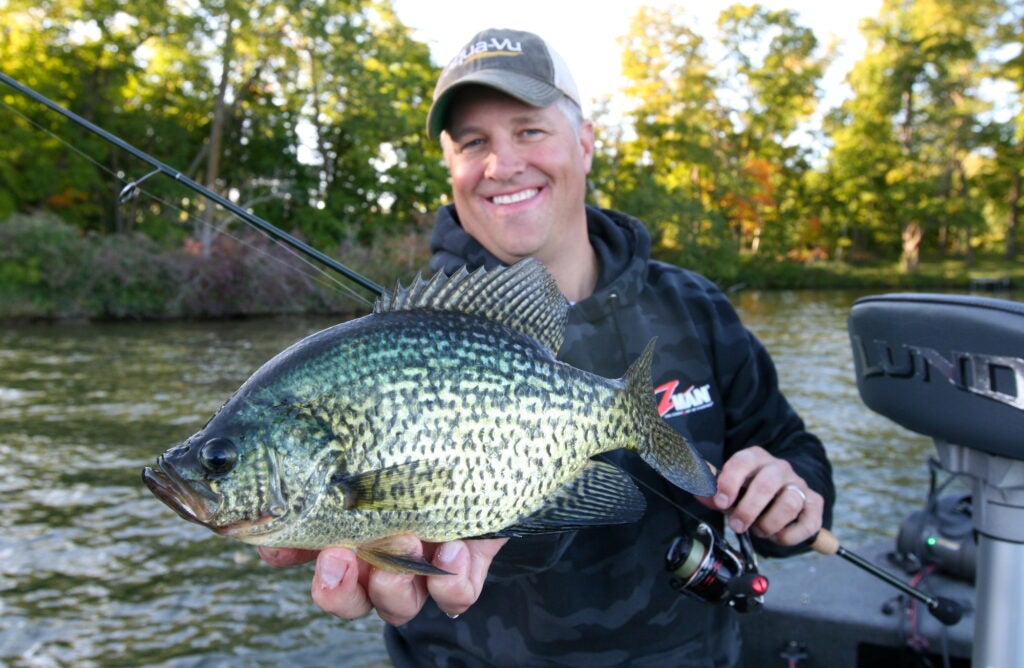
Water Clarity
In dirty or stained water reach for a bright colored bait or one that has vibration. Anything with a blade like the Road Runner or the Mr.Crappie Spin Baby will put off vibration that helps crappie locate the lure by feel rather sight.
Depth of Water
In spring crappie go shallow to spawn and then return to deeper water during the heat of summer. In spring, a lightweight jig is ideal for fishing depths of 1 to 3 feet. In summer, you might be shooting deep water docks with a Bobby Garland Mo’ Glo Slab Slay’R or trolling with a Rapala Ultra Light Shad.
Technique
There are a ton of ways to catch crappie and the lure you choose needs to match the technique you’re using. The best crappie lure for skipping docks won’t be the best crappie bait for jigging deep brush piles. I’ve made choosing the lures easy by identifying which crappie lures are best for different applications.
FAQs
Q: How do you fish for crappie with artificial lures?
Like most serious crappie anglers, I’ve caught a multitude of fish on live minnows, particularly on a spider (spreader) rig or beneath a float. When fishing is extra tough, a live shiner, crappie minnow or some type of insect larvae can’t be beat. That said, once you understand how crappies feed, live bait is rarely necessary.
For extra selective crappies, for example, I like to tie on a 1/16- or 1/32-ounce black hair or marabou jig, which crappies almost always eat without hesitation. Or consider downsizing your soft plastic bait, going from a 2- or 3-inch bait to something around an inch in length. Look to tiny tungsten jigs and microplastics used by ice anglers. Scientific studies have shown that crappies often dine heavily on microscopic zooplankton, and they make even a 1/64-ounce jig, and 1-inch bait look like a big bite of food.
Q: Do you use a float/bobber for crappie?
Especially in the spring or anytime crappies hold in shallow water or around shallow brush or grass, I’ll fish a float with a small jig at least three-fourths of the time. I prefer a sliding balsa (slip) float, which can be adjusted to hover a bait at any depth. The addition of a stop knot or bobber stop on your line, with a tiny plastic bead between the float and the stop is the simplest way to fish a float. For fishing shallower than three feet, a small, fixed float or clip-on style bobber also excels.
The key is to properly “load” the float with a jighead and additional pinch-on or split-shot sinkers. The objective is to make the float sit upright in the water, stem just barely protruding above the surface, so it’s visible and nearly effortless for a fish to submerge. When crappies feel little or no resistance, they’re much more likely to eat and hold the bait, signaling a strike and yielding a successful hookset.
Q: Do crappies like spinners?
At times, especially when covering water by trolling or swimming a lure—or in stained to dirty water—a small spinner blade on any lure or jig can trigger many more bites. Also, when I discover crappies are feeding on small shiners, shad or baby panfish, a Road Runner bladed jig or even a small spinnerbait will often out fish non-bladed baits by wide margins. Conversely, in extra clear water, I’ve found that the addition of a spinner may spook fish. Most of the time, however, crappies key on the flash of the metallic spinner blade and track it via underwater vibration.
Why Trust Outdoor Life?
Since 1898, OL has been a leading authority in testing and reviewing hunting gear, fishing tackle, guns and shooting equipment, and much more. We have more than a century-long history of evaluating products, and we’re now bringing that expertise to online reviews. Our editors are experienced outdoorsmen and women, and most importantly, we’re trained journalists. We prioritize field testing and objective data when reviewing products. We conduct interviews with gear manufacturers and engineers as well as outdoor experts so that our readers have an understanding of how and why a product works—or doesn’t.
Advertising does not influence our gear reviews and it never will. While we always focus our coverage on standout products—because we want our readers to be aware of the latest and greatest gear—we also cover the flaws and quirks of any given product.
Final Thoughts on the Best Crappie Lures
Amid a mountain of available crappie bait—jigs, plastics, spinners, crankbaits, etc.—I challenge you to try something new this coming year. If you haven’t fished a tiny paddletail swimbait or a crappie crankbait, give one a good test. If you’re having trouble locating fish, try trolling. Once you find a fish or two—perhaps with a small crankbait or spinnerbait— you can almost guarantee more crappies will live in the area. Stop, slow down, and cast a slow-moving jig or a float and soft bait combination. Finally, consider that it’s rarely necessary to harvest an entire limit of 20, 30, or 50 crappies a day. Three or four 9- to 11-inch fish are more than enough to fill our bellies. But if you’re planning to supply an entire neighborhood fish fry, please consider releasing your larger crappies to swim and spawn another day.
- Best Overall: Southern Pro Lit’l Hustler Tube
- Best Versatile: Z-Man 2-Inch GrubZ
- Best Crankbait: Rapala Ultra Light Shad
- Best Hair Jig: Jeff’s Jigs & Flies Panfish Leech
- Best Jig: Blakemore Road Runner
- Best Spinner/Blade Lure: Strike King Mr. Crappie Spin Baby Spinnerbait
- Best Dock-Shooting Bait: Bobby Garland Mo’ Glo Slab Slay’R
- Best Pre-Rigged: VMC Tungsten Probe Jig
- Best Kit: Bobby Garland 158-piece Deluxe Crappie Kit
- Best for Ice Fishing: Akara Midge
- Best for Spring: Puddle Jumper
- Best Float: Thill Floats Wobble Bobber
- Best for Big Fish: Z-Man Micro Finesse Shad FryZ
- Best for Trolling: Rapala Husky Jerk
- Best Live Bait: Wild Baby Shiner Minnows
The post The Best Crappie Lures of 2023, Tested and Reviewed appeared first on Outdoor Life.
Articles may contain affiliate links which enable us to share in the revenue of any purchases made.
Source: https://www.outdoorlife.com/gear/best-crappie-lures/

